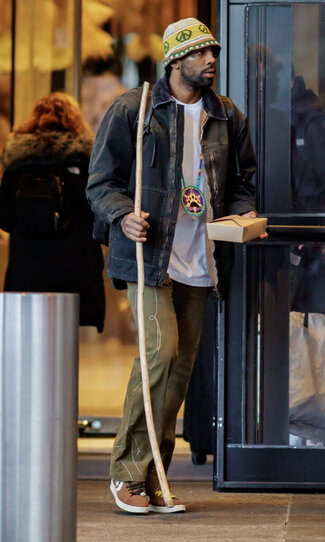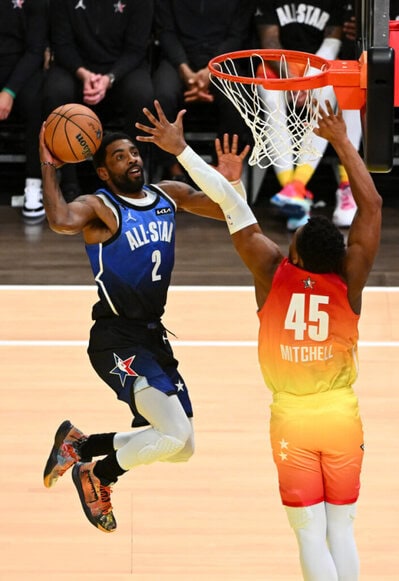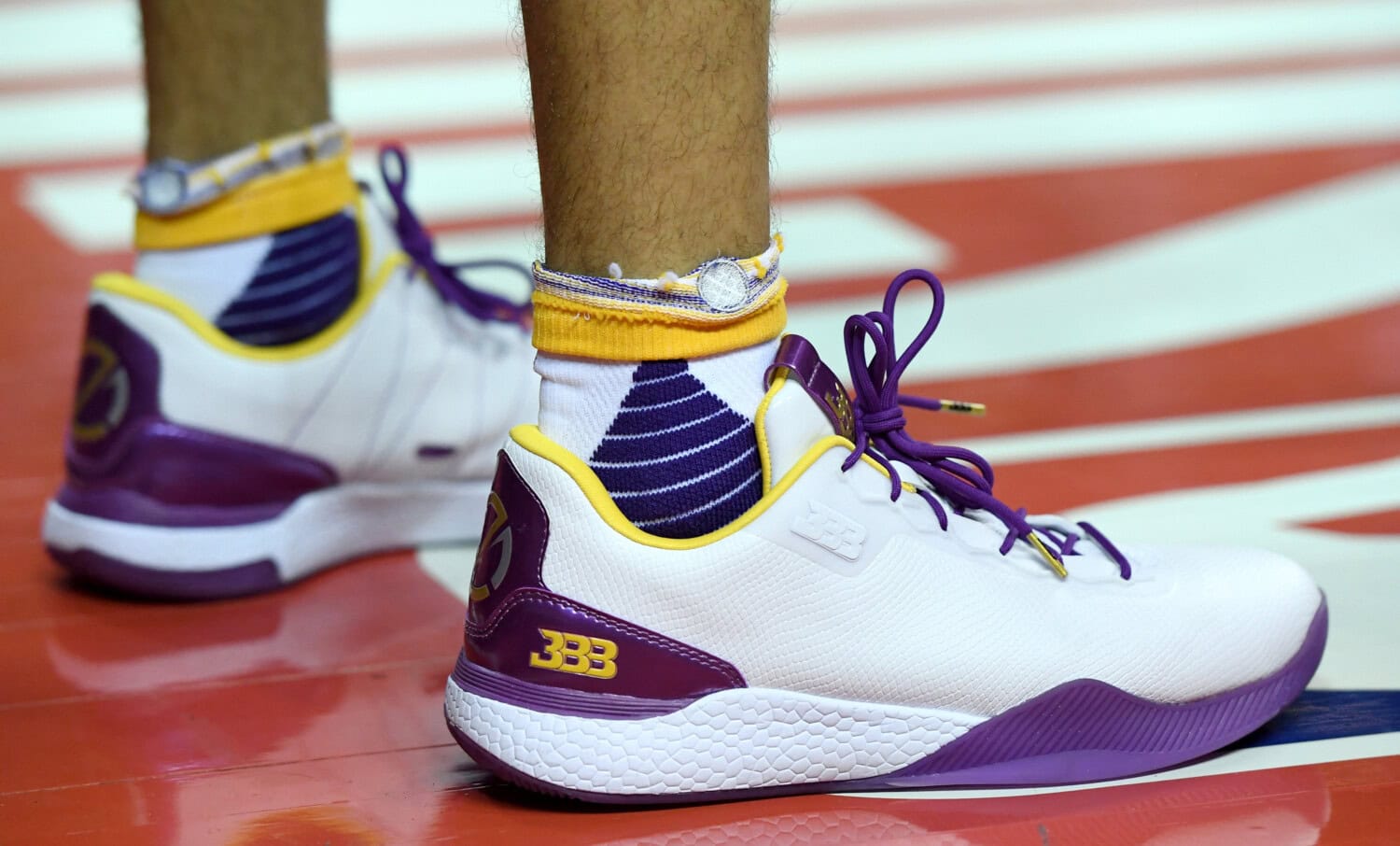What is the next step for Uncle Drew’s sneaker story? Boardroom breaks down the possible options for basketball’s bestseller.
Kyrie Irving did something last weekend that he hadn’t done in over a decade: He hit the hardwood in non-Nike sneakers.
Not since scoring 13 points in the Reebok-sponsored 2010 McDonald’s All-American Game had Kyrie played publicly in basketball shoes not associated with the brand or its Jordan Brand subsidiary.
But on Mar. 11, Irving unveiled the Ethics LG Two, the signature shoe from Ethics brand founder and basketball journeyman Langston Galloway.
“I wanted to show him some love,” Irving told ESPN’s Tim MacMahon.
For Ethics, Irving’s unpaid endorsement was validating — but it also has the potential to be quite lucrative.
From a mere metrics standpoint, Ethics Brand boasts 14.1 thousand followers on Instagram. Conversely, Irving’s personal page has over 18.7 million followers alone.
For reference, that’s noticeably more than the 14.4 million audience size that Nike Basketball reaches on the same platform.
Since signing with the Swoosh in 2011 and becoming a signature athlete in 2014, Irving ascended as basketball’s best-seller, where performance pairs were concerned.
In single seasons, the Nike Kyrie collection could outsell entire categories at global brands competing in the same space.
However, in December of 2022, everything changed in a wave of controversy that saw Irving suspended by his former team, the Brooklyn Nets, following a series of alarming remarks. Nike, the company that outfitted him as a freshman at Duke all the way to a signature stint that spanned eight NBA years and multiple models, ultimately called it quits on their relationship.
With Irving’s deal set to expire in October of 2023, the duo agreed to mutually part ways early, making Kyrie a true sneaker free agent.
Since then, Irving has been taping up early installments of his signature shoes, using would-be Swoosh real estate to transmit messages built on themes of liberation.
All the while, Kyrie kicks old and new have appeared on the feet of NBA youth who grew up on his line, a cadre of Uncle Drew descendants enamored with his skill and style.
While the 2023 NBA Playoffs may provide the proving grounds for where the point guard will eventually sign this summer from a franchise perspective — with substantial money on the line — this ongoing period of Kyrie Irving’s sneaker free agency proves equally intriguing.
Leaning on lessons from the past, Boardroom breaks down Irving’s unique and likely lucrative options in regard to his footwear future.
Cult of Personality
Kyrie Irving is widely regarded as one of the most skilled, distinctive players in basketball.
Many of the game’s best ball-handlers, from Jason Williams to Allen Iverson to Jamal Crawford, rank Irving among the best to ever dribble the rock on an NBA court, while his ability to finish at the rim often rivals that of those far more vertically gifted than himself.
His flash has made him a fan favorite for more than a decade, and his on-court artistry has made him a player plenty of up-and-comers have sought to mirror. Even the analytics crowd can’t knock Kyrie on-court, as his penchant for 50/40/90 shooting splits places him among the efficiency elite.

Nonetheless, it’s the relationship between the player and the media — and sometimes Kyrie and popular consensus in general — that makes him arguably the most polarizing figure in pro sports.
Particularly since seeking green pastures in Boston back in 2017, Irving’s availability based on injuries, contract disputes, vaccination laws, and controversial topics in public discourse have kept him in headline after headline, even when he’s not on the court.
Nonetheless, he’s consistently remained among the game’s most popular players when it comes to beloved elements of fan service, such as taking a picture or signing an autograph.
In press conferences and on talking head shows, however, he’s typically more maligned than any star of his status.
It all came to a head in October of 2022 when Kyrie shared a link on social media that featured false Adolf Hitler quotes and defamatory conspiracy theories about Jewish people.
Though Irving has consistently denied promoting anti-Semitic rhetoric or discriminating against any group, the fact that he posted an Amazon link to a documentary declaring such exact sentiments tied him directly to the toxic conversation that was already bubbling by way of famous figures like Ye, who himself lost a major deal with Adidas in the wake of inexcusable remarks.
In the time since, Irving has kept a far lower profile in front of the cameras and on social media, eventually asking to be traded from the Brooklyn Nets to the Dallas Mavericks.
The course of events was more than enough for Nike to drop Irving in December — a split both parties seem content with.

Since entering footwear free agency, Kyrie has used the brand break as a means to amplify messages of African liberation and freedom for oppressed people all over the world.
And while he no longer has the marketing machine of a multi-billion-dollar sportswear engine behind him, his new lease on life in terms of both corporate independence and his own spiritual quest has given him an opportunity to find new ways to connect to his core audience on a deeper level.
Indeed, Kyrie fanatics love him more than your average NBA All-Star, when it comes to social shares and support. This power absolutely can be and has been used for good, as Irving’s popularity proves both consistent and profitable by way of jersey purchases.
But it’s always registered most by way of shoe sales.
With Nike no longer making a signature Kyrie Irving sneaker, could the player do it himself?
The Ewing Theory
Thirty-five years before Nike parted ways with Kyrie Irving, a different kind of divergence took place between an NBA All-Star and a major brand.
Patrick Ewing, once the face and feet of Adidas, had his agent, David Falk, negotiate a release from a contract worth $750,000. The unlikely leave was due to the untimely passing of Adi chairman Horst Dassler and what they considered a lack of direction for the brand.
Ewing, a larger-than-life hoop hero who almost had his own Nike line, was playing in basketball’s biggest market without a sneaker deal to his name. Rather than take a flyer from a big brand looking to make a quick buck, Falk found a way to manipulate the industry by pulling in PONY’s Roberto Muller.

“I asked him if he could make a shoe similar to what Patrick had worn with no logos whatsoever in pure white,” Falk told Boardroom in 2022. “Before we sign another shoe contract, I want to create a buzz about what Patrick is wearing. I want to be mysterious.”
For a single season, Patrick played high-level hoops in blank basketball shoes that were almost identical to his once infamous Adidas Attitude high tops.
“It created quite a buzz,” Falk said. “People were curious. After a period of time Roberto said, ‘If Patrick were open to it, we’d love for Patrick to create his own company.’ Having just done Air Jordan, I loved the idea. I loved the idea of Patrick having his own brand instead of just being an endorser.”
When considering the speed of the internet and its impact on manufacturing, it’s completely conceivable that an inspired-by silhouette featuring the come-to-be-expected performance cues of shoes like the Kyrie 1 or Kyrie 3 could be made in time for Irving to play in during the 2023-24 NBA season, if not sooner.
Such a play could put Irving in hot water, if key elements of the design are too close for comfort, with his former brand big on suing imitators of late. Nike also happens to be the NBA title sponsor for all on-court apparel, but the prodigal point guard is as unafraid of controversy as any athlete we’ve ever seen.
For fans of Kyrie on-court, his signature shoes register as much as Kyrie collaborations, as they do Nike designs.

Creating a Kyrie brand — Irving often writes out “A11EVEN” as a potential option, or perhaps Hélà Athletics proves to have the right ring to it — is an easier lift in 2023 than it was for Falk and Ewing in 1989. Additionally, such an athlete empowerment move would align with Kyrie’s fundamental drive to build one’s own tribe.
When retracing history, the move for Patrick back in the day was an unusual risk that quickly proved lucrative.
“It was more than simply royalty income,” Falk said. “He actually owned 20 to 25% of the entire company. He was building his own brand that he owned equity in. It really was a dramatic step in the evolution of athletes as brands.”
Since the advent of Ewing Athletics, the likes of Michael Jordan and Stephen Curry have built their own brands within the corporate umbrella of Nike and Under Armour. While Irving is actually in a similar echelon in regard to sneaker sales, the blueprint for producing and selling one’s own sneakers likely leans more on recent independent efforts established by Lonzo Ball, Spencer Dinwiddie, and Langston Galloway.

We have already seen Irving show love to Langston by way of appearing in his Ethics line. However, perhaps more telling for Kyrie’s curiosity is the path paved by Ball and Dinwiddie.
From a business standpoint, both ballers found footing on their own by producing pairs eerily similar to classic Kobes once produced by Nike. In spirit and in style, there’s an argument to be made that Kyrie is as close to Kobe as it gets where performance footwear is concerned.
So, if respectable players of lesser acclaim and popularity, by comparison, can manufacture and sell their own signature shoes stylized off favored performance pairs from the past, why can’t Kyrie?
The Sun Rises in the East
At the time of typing, it is unlikely Kyrie Irving will sign a shoe deal with a US-based company.
Parting ways with Nike conceivably precludes opportunities at umbrella brands like Converse or Jordan. Due to Irving’s affiliations with Ye during Donda Sports’ quick rise and fall, you’re wagering an odd optics look for Adidas.
When moving down a notch to rising recent re-entries into the American basketball market, it’s still shaky. Aside from Kawhi Leonard, New Balance has not signed a signature athlete for their hoop range, with the ROI on their biggest endorser not exactly moving mountains. The brand has also leaned towards landing far less outspoken endorsers than Irving.

Moving on to Puma, the booming brand essentially has its own Kyrie by way of LaMelo Ball, whose first two signature shoes not only crush at retail, but bear striking similarities to Irving’s first namesake model and have already reached a respectability for their performance.
Around the industry, there is a world in which Reebok or AND1 look to make a major splash back on the NBA hardwood with Kyrie as their leading man. Authentic Brands Group would have to sign off on Reebok’s re-entry, however, while AND1 would likely have to offer significant equity points to come anywhere near Irving’s asking price.
His style and audience do align with the brand’s storied history, but it would likely take some considerable incentive clause creativity to interest Irving.
Taking these unique conditions together, it’s likely that the biggest bag, fastest production, and longest money comes by way of the Asian market.
Like Dwyane Wade, Stephon Marbury, and numerous 30-something stars of past years, partnering with Chinese brands and selling to a population of over 1.4 billion residents has proven profitable.

For reference, Foot Locker had 802 stores in the US as of 2022. Anta, the sportswear sponsor to Klay Thompson and Gordon Hayward, possesses over 10,200 stores in Mainland China and overseas alone, where it ranks as China’s #1 domestic sportswear brand.
Look up locations for Li-Ning — the brand behind Way of Wade — and the numbers match, with over 7,000 stores in thhe region. Just the same, PEAK pushes product in over 5,000 Chinese retail outlets.
Savvy superstars with enlightened agents know these numbers and they’re earning handsomely off them.
Back in 2012, Dwyane Wade signed a 7-year deal with Li-Ning, that has paid him millions annually and has since been extended into a Lifetime Deal. In 2014, Klay Thompson signed on with Anta for more than $2 Million per year. In 2017, as the Warriors were amidst a dynastic run of championships, the two sides tore up Thompson’s prior deal and expanded the partnership into a new contract boasting a potential worth of up to $80 million over ten years.
Though there are arguments on both sides as to whether Kyrie Irving will ever earn another NBA championship ring, it’s undeniable how much more powerful, popular, and profitable his footwear forays were than Wade and Thompson during his days with Nike.
If Kyrie were to take on a contract with a power player in China — whether to formally endorse their brand, co-build his own brand, or use their factories to white-label his own line — the precedent set by his peers is perhaps a bigger bag than he was getting in Beaverton to begin with.
Additionally, it’s not far-fetched to think that he could bring in artistic talent like Soles by Sir and Ben Kirschner — creatives behind both of his customized All-Star sneakers — to uphold an aesthetic signature to his style.
Just the same, it’s not a reach to think that former teammate and fellow footwear free agent Jaylen Brown could be brought into the fold.
Ultimately, where the jockeying ends with Kyrie’s footwear free agency is anyone’s guess. Like other athletes and entertainers before him, the public breakup with a big brand like Nike, as ugly as it was, could open up a new (and roundabout) path to booming business.
Nike’s not short on superstars who can sell sneakers, while Kyrie’s list of suitors is longer than those on the outside looking would have likely predicted.
Though we don’t know just what slogan and logo Kyrie’s kicks will showcase in the games to come, what’s already certain is that Kyrie sneakers will remain a fixture in and around the basketball conversation for years to follow.